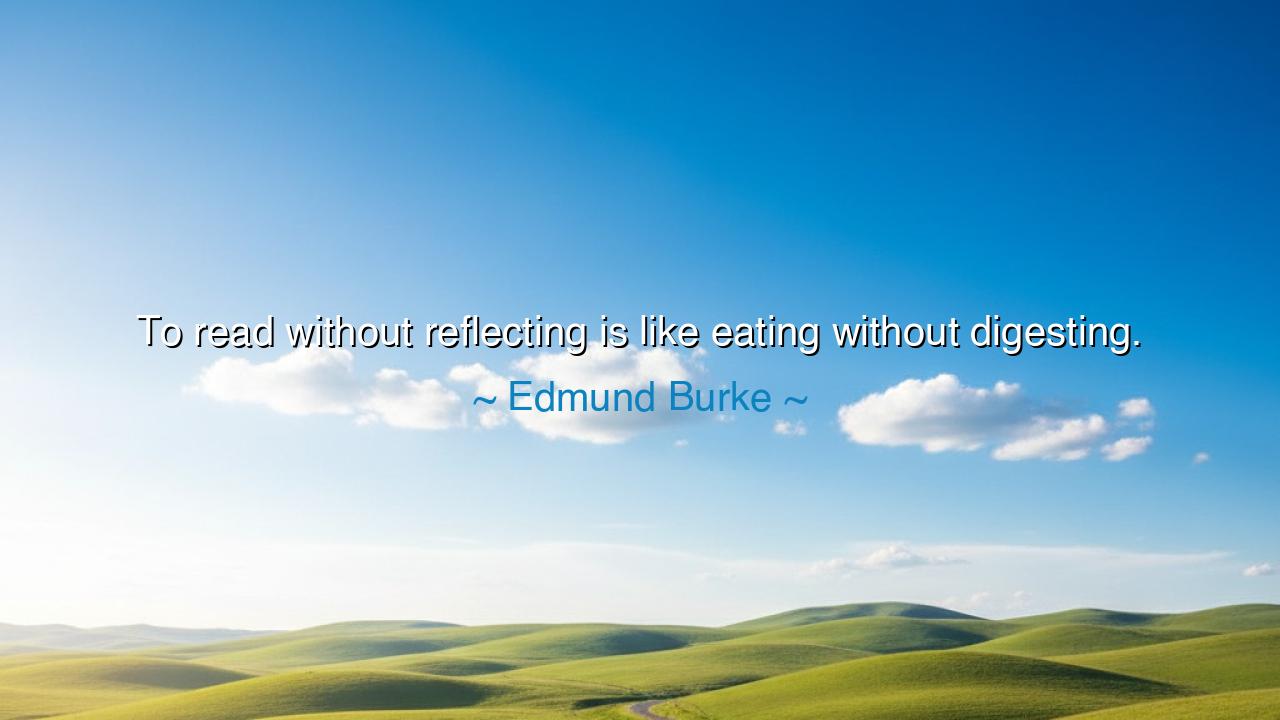
To read without reflecting is like eating without digesting.






“To read without reflecting is like eating without digesting.” Thus spoke Edmund Burke, the great Irish philosopher and statesman, whose wisdom bridged the realms of intellect and morality. In this single sentence, he reveals a truth that has guided thinkers since the dawn of civilization — that knowledge without reflection is hollow, and learning without understanding is wasted. To read is to take in words; to reflect is to turn them into wisdom. Just as food, once swallowed, must be digested to nourish the body, so must thought be digested by contemplation to nourish the soul.
Burke lived in an age of revolution — of pamphlets, speeches, and fiery debates that shaped the birth of nations. He saw how easily men mistook the mere accumulation of words for true wisdom. Many read books, listened to orators, and repeated ideas as though the act of knowing them were enough. But Burke, ever the observer of human nature, warned that reading without reflection breeds not enlightenment, but confusion. Information taken in but not pondered upon becomes like undigested food — heavy, useless, even harmful. It clogs the mind instead of strengthening it.
To reflect, therefore, is the sacred act that transforms what is external into what is internal. When we read, we encounter the thoughts of others — their discoveries, their passions, their fears — but until we turn inward and ask, “What does this mean for me? What truth does it reveal about the world?” we remain spectators, not participants, in the great banquet of knowledge. Reflection is digestion: it breaks down what is complex into what can be lived, breathed, and remembered. Without it, our minds become mere warehouses of borrowed ideas, not gardens where wisdom grows.
Consider the example of Marcus Aurelius, the philosopher-emperor of Rome. He read deeply — the works of the Stoics, the teachings of the Greeks — yet he did not stop at reading. He wrote reflections, his Meditations, where he digested what he had learned through the trials of his own life. Each night he pondered what virtue demanded of him, what his duties were, how to live rightly amid chaos. It was not his reading alone that made him wise; it was his reflection upon what he read. Through this daily digestion of thought, he turned philosophy into life, and life into philosophy.
This is the lesson Burke offers us: that the act of reading is not the end, but the beginning. In an age overflowing with voices, books, and words, the danger is not ignorance, but shallow understanding. We consume ideas as if they were fast food for the mind — quickly, endlessly, without pause. But truth cannot be swallowed whole; it must be savored, broken down, questioned, and absorbed. The wise reader reads slowly, allowing each thought to settle and nourish the spirit. The fool reads much but grows little, for he lets ideas pass through him without transformation.
Even in Burke’s own time, he saw this folly among scholars and politicians alike — those who quoted great works but understood nothing of their spirit. “To read without reflecting,” he said, “is like eating without digesting,” because both acts promise sustenance but deliver only illusion. The scholar who reads without reflection grows proud of his memory but starves in understanding. The glutton of words is no wiser than the glutton of food — both mistake quantity for quality, and both remain empty in the end.
So, my listener, take this wisdom into your life: when you read, do not hurry. Read as the ancients did — with reverence, with silence, with purpose. Let the words sink into your heart, and ask them questions. What truth hides behind them? What do they demand of you? Reflect after reading as one rests after a meal — to let the nourishment take hold. Keep a journal, write your thoughts, speak them aloud to yourself or a friend. Turn knowledge into action, and action into wisdom.
For in the end, Edmund Burke teaches us that reading without reflection is not learning at all — it is mimicry. True learning transforms the mind, strengthens the spirit, and guides the soul. Digest what you read. Make it your own. Let every book become not just something you have finished, but something that has finished shaping you. For only then will you taste the fullness of wisdom — and your mind, like the well-fed body, will grow in strength, balance, and grace.






AAdministratorAdministrator
Welcome, honored guests. Please leave a comment, we will respond soon